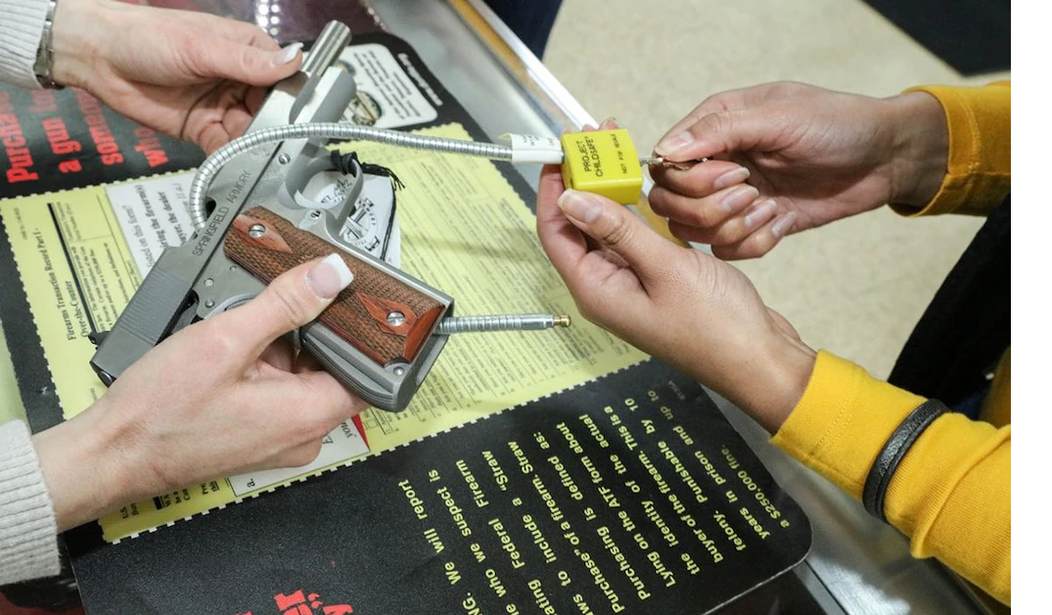Tennessee Gov. Bill Lee is still stumping for a “red flag” law, but he doesn’t want to call it what it is. Instead, the governor is calling on the Republican-controlled legislature to deliver him a bill establishing “temporary mental health orders of protection” instead. What’s that?
Well, it’s a “red flag” law by another name.
Law enforcement would first determine if a person is a threat, then a hearing with the person in question would be held, and a judge would rule whether they should indeed have their weapons taken away temporarily. If so, the person would have to surrender their guns, ammunition and any handgun carry license to a third party within 48 hours, for up to 180 days.
A person facing a order of protection petition would be offered a court-appointed attorney, and anyone determined to have filed a frivolous report could face a felony perjury charge. There would also be a mental health evaluation.
Lee said top lawmakers gave input on the proposal and argued it isn’t a “red flag law.” He called that term a “toxic political label meant to draw lines in the sand so nothing gets done.”
No, it is a “red flag” law, albeit it one that has far more due process protections that most of the versions already enacted around the country, which allow for ex parte hearings where the subject of the petition is not present to provide a defense. The vast majority of “red flag” laws also don’t allow for the use of public defenders, given that they’re civil matters, and a mental health evaluation is generally not a part of the process either, at least in most states (Maine is a notable exception, requiring both a judicial finding and a mental health professional’s determination that a person poses a danger to themselves or others).
So far, however, the GOP caucus in the Tennessee House doesn’t appear interested in complying with the governor’s demands.
— TN House Republicans (@tnhousegop) April 20, 2023
Another problem for Lee? While the governor maintains that his “temporary mental health orders of protection” would provide due process protections for gun owners and address mental health concerns, there’s no actual bill for lawmakers to vote on.
Lt. Gov. Randy McNally, who runs the Senate, has said the governor’s proposal strikes the right balance.
The path ahead is unclear, and Lee’s plan still hasn’t been put onto a bill. As Senate Democrats called for a vote on the proposal, Sen. Jeff Yarbro of Nashville on Thursday tried to force a floor vote on a similar plan. Republicans rejected it on procedural grounds.
Republican House Speaker Cameron Sexton said he’s committed only to finding “the best path forward to protect Tennessee children.”
… The National Rifle Association’s legislative arm said Tennessee law already allows for “detention of dangerous individuals experiencing a mental health crisis by a law enforcement officer, physician, psychologist, or certain other designated professionals.”
Lee has said “involuntary commitment” would “restrict all kinds of constitutional rights, including the Second Amendment.”
That may be true, but if someone is truly a danger to themselves or others, then simply taking their guns away and leaving them unfettered access to knives, matches, gasoline, rope, pills, or anything else they could use to take their own life or harm others is a truly stupid way to address the underlying dangerousness of the individual. An involuntary commitment would be a much more appropriate remedy, but there’s a shortfall of inpatient beds for those in crisis in the state at the moment, which may be one reason why Lee is calling for a restraining order that would take guns away but leave the dangerous individual walking the streets. Fixing a broken mental health system will cost serious money and take a significant effort. From a political perspective, enacting a “temporary mental health order of protection” allows Lee and other lawmakers to say they’re “doing something” without having to tackle the much deeper and more fundamental issues with the state’s mental health system itself.
While I do think that Lee’s at least listened to gun owners and addressed some of the major objections to “red flag” laws, the fundamental issue that I have with his proposal (and the other “red flag” laws already on the books) is that they’re ostensibly about dangerous people, but they’re exclusively focused on their potential gun ownership and not their dangerousness itself. Both Lee and Republican lawmakers should be trying to fix the state’s broken mental health system rather than passing a “red flag” law. No matter what the governor wants to call it, it’s still the wrong approach to stopping dangerous people from doing harm to themselves or others.









Join the conversation as a VIP Member